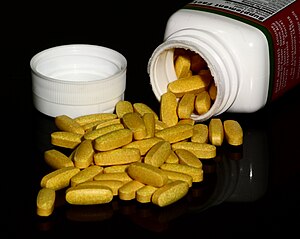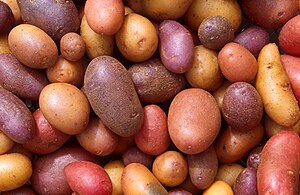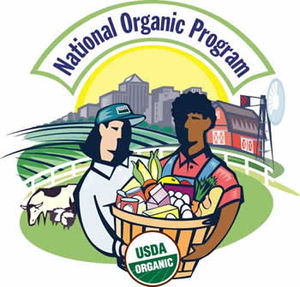Welcome back! We hope you had a nice holiday weekend, and enjoyed the eco-friendly Easter tips we shared with you last week. This week we're wrapping up with our "going organic" series with a couple more important topics for those wishing to live a healthier and greener lifestyle.
There’s an interesting trend happening in natural and organic living. People who tout the consumption of plenty of fresh fruits and vegetables, also seem to consume a lot of supplements. I’ve had many people ask me about this. If you’re living a healthy lifestyle, why do you need supplements?
|
|
| Dietary supplements, such as the vitamin B supplement show above, are typically sold in pill form. (Photo credit: Wikipedia) |
And it’s a very good question.
Many people living an organic lifestyle cite depleting soils, premature picking, cooking, processing and other factors as decreasing the nutritional value of our food. But here’s my take on it. If you’re eating healthfully, exercising regularly and unless you have specific health issues, supplementation may not be necessary - but it may improve your overall health, just depending on your specific needs.
Supplements are big business. Whether they’re synthetic or they’re natural (if you do take them, go natural), it’s a business that must convince the consumer they need their product. It’s a decision that each person needs to make for themselves and it’s important to remember that having too much of certain vitamins and minerals can actually be harmful.
And more importantly, supplements can be very expensive and you need to decide carefully if they need to be in your budget.
Many people claim they’ve never felt better when taking a specific natural supplement for a specific purpose. That’s absolutely wonderful and if you’re getting the results you are looking for, more power to you. Just realize that some supplements can create dependence and even though they’re natural, can harm you.
Recently Dr. Oz shared some tips for considering supplements:
- Choose single ingredient supplements and just take the ones you need
- Do your research thoroughly
- Beware of trendy supplements
And here’s how I approach it:
-
Eat more raw food: The more raw fruits and vegetables you eat, the more nutritional value you can pack in. Cooking strips food of vitamins and minerals, so while you may still eat the same amount of cooked food, you’re reducing the benefit you receive. If you can
grow your own, or get them
fresh and locally grown, that's even better, as the vitamin content of most fruits and vegetables tends to decline rather rapidly once they're picked.
-
When you cook, eat real food, not pre-made processed food.
Cooking your own food ensures you can use more wholesome ingredients and use cooking methods that retain the most nutritional value possible.
-
Stay active. A lot of your health depends on being active and getting plenty of exercise. You can take all the vitamin supplements in the world, but you still need to get moving. Exercising gives you more energy and can give the same type of boosts that supplements can, but exercise is truly natural. Check out
http://www.newholisticliving.com/exercise.html for some fun ways to exercise.
-
Pay attention to your body. Eating and living healthy isn’t a foolproof way to stay healthy, unfortunately - it just improves your odds. So do pay attention to your body and seek medical advice, where needed.
- Sleep well. A lot of the reason many of us feel run down is because we simply don’t get enough sleep. Make it a priority and organize your day, giving yourself plenty of wind down time so you can get a proper night’s rest.
And finally, if you're concerned, you can get tested. There are blood tests that you can get to ensure your body is getting enough vitamins and minerals. Go ahead and get one. You might be surprised that you’re as healthy as a horse. And if you’re not, then you'll know about it and you can take action on those findings. (Vitamin D is definitely one you'll want to ask about - the majority of people in the modern world are deficient in this vitamin, which is one of the most important for your health. The test for this is simple and inexpensive.)











